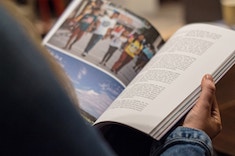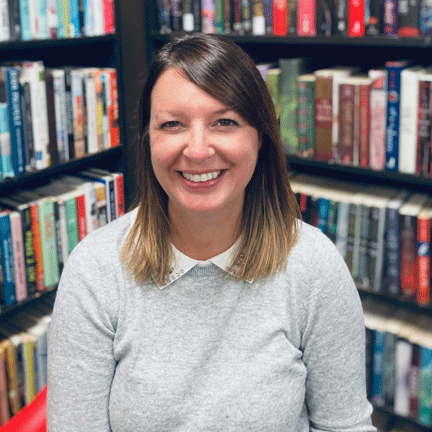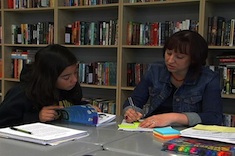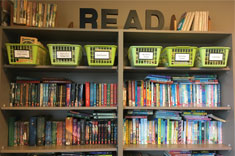When I first start talking about the amount of independent reading we will be doing in class during the year, I expect some of the following reactions: some groans, some wide-eyed looks of surprise shared among friends, and a few head nods from my students who already identify as readers. I take these reactions in stride, knowing that by the time these same students step into my classroom next year, they will be much more confident in their reading lives. Many more of them will identify as readers. They will all know what they are capable of accomplishing when it comes to reading, and most will easily be able to find their next book on their own. This is the beauty of a classroom where independent reading is a major focus.
But this September, I encountered a new reaction, one that I hadn’t come up against in my classroom, a reaction that I would describe as fear.
Levi
At the beginning of the year, I give my 11th-grade students a survey to help me determine their reading habits and where they are as readers. One student’s response stuck out, especially since it was in all caps: “I REALLY HATE READING.” Okay, got it, point taken. These types of students don’t scare me. In fact, they are sometimes my favorites, because I know that by helping them find the right books, I can have the most effect and see the most change in them as the year progresses.
Then, a few days later during a book pass, the same student caught my eye and said, “I really hate reading.” When I saw his face and heard his tone of voice, it dawned on me. The idea of reading each day in class was actually scaring him. A week later when I had my students check in with their book title and current page number in Google Classroom, the same student added in the comments, “I’m not joking, I really don’t like to read.” My suspicions were confirmed: Levi was afraid of reading.
I knew I had to find out where this fear was coming from. Levi reads at grade level and is not on an IEP. What is holding him back? Talking with him gave me a little more information. “I read something and I just don’t get it. I can read the same page three or four times and I just can’t keep focus,” he told me. I acknowledged his problem—this happens for a lot of people. I also shared with him that the best way to improve his reading comprehension was to read more.
I likened it to my current marathon training. Never did I think I would be able to run the 18 miles that I completed last weekend, but I keep running each week, and the more I run, the better I become. I discovered that he did like the book that he had begun reading, Nemesis by Brendan Reichs, and that he wanted to continue with it. He told me that he was more confident in his listening skills, so we came up with a plan where he would look for an audio version of the book on YouTube and read along with it during silent reading. I could see relief flood his face at this suggestion. The goal will be to eventually move on from the audiobook, but for now, it makes him feel better about proceeding with his reading.
Brooklyn
On the reading habits survey, Brooklyn indicated that she likes to read and that she looks for books that suck her in and carry her away to another world. I recommended The Female of the Species by Mindy McGinnis to her, and it fit the bill. When she finished the book, she came back for another suggestion. After the third book recommendation she asked for, I tried nudging her to make her own selections, but she was very reluctant to do so, saying that she just liked me to pick the books out for her. Although I was happy to see Brooklyn reading so much, I wanted her to gain the skill of making her own book selections. My goal is to create lifelong readers, and in real life there isn’t always a teacher waiting to hand you your next read.
During a reading conference, Brooklyn said that she liked getting book recommendations from me because she was afraid that she would pick a book she didn’t like. There was that feeling of fear again. To combat this fear and to foster independence, I gave Brooklyn a few different strategies for making her own book selections. First, I showed her how when you look up a book title on librarything.org (the system I use to catalog my classroom library), it gives you a list of similar titles that you might also like. I also show book trailers on a fairly regular basis at the beginning of class, so I recommended that she record book titles in her notebook that looked intriguing. Last, I suggested that she use the expertise of her peers. Brooklyn sits at a table with a group of avid readers who would have many title suggestions for her. With these simple strategies in hand, she agreed to make her next book selection on her own.
Dylan
Dylan, also an 11th grader, was quick to tell me that the last book he read all the way through on his own was Diary of a Wimpy Kid. I wasn’t shocked or disappointed; this is the case for a lot of my students at the beginning of the year. And this bit of information actually helps me understand that he might be interested in a humorous book, so I recommend some of Don Calame’s books, such as Swim the Fly or Dan vs. Nature, which never fail to appeal to my high school boys’ sense of humor. But before I could even get a chance to tell him what they were about, I saw a distinct look of fear on his face as he quickly cut me off with, “No! Those are way too long for me!” I later noticed him taking the slimmest volume he could find off the shelf, The Dear One by Jacqueline Woodson. He later confided that this book wasn’t catching his interest, which wasn’t too surprising, since the target audience for that book would definitely be a girl.
When I prodded him a little more about what he liked, he admitted that he had also enjoyed listening to Z for Zachariah when a teacher read it aloud to the class when he was in junior high. I gave him a stack of books that were more in the dystopian, science fiction vein and was once again met with a look of terror. “All of those books are way too long for me,” he sputtered. I tried explaining that he shouldn’t focus on how long a book is, but rather on how interesting it is. It might take longer to get through a short book that doesn’t hold your interest, but a longer book that really holds your interest might fly by because you’re enjoying it. He finally agreed to try The Eye of Minds by James Dashner. So far, he’s been enjoying it and trying not to worry about how long it will take him to finish it.
Becoming Readers
My experiences with Levi, Brooklyn, and Dylan have reminded me that the idea of becoming a “reader” can be truly scary for students who doubt their abilities or who have had negative experiences with reading in the past. Simply acknowledging their fears and talking with each student has caused their initial fears to subside somewhat. Each has a plan for the near future, but I know that they will need more coaching and encouragement as the year continues. I once saw the quote “Being brave isn’t the absence of fear. Being brave is having that fear and finding a way through it.” I hope to help these students become brave readers.






